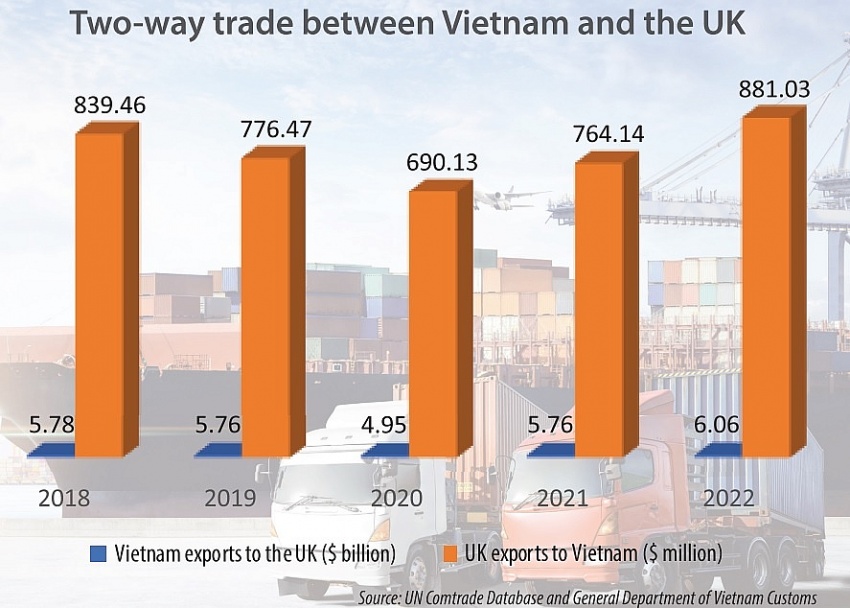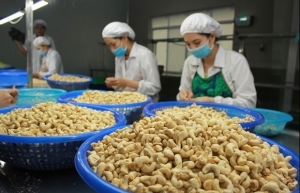British leaders enthusiastic over CPTPP implementation
According to a new statement by the UK government on the impacts of the agreement (CPTPP) on its economy, over 99 per cent of British goods exports to member countries will be eligible for zero tariffs, improving goods market access for British firms. Businesses selling key UK exports such as cars and machinery will benefit from the removal of tariffs. In the long run, joining the CPTPP could lead to a £1.7 billion ($2.1 billion) boost to UK exports to other member states.
 |
“The removal of tariffs should also help UK businesses, such as Derbyshire-based Denby Pottery, be more competitive and reach CPTPP’s vast consumer base. And companies like Conker Distillery could gain from new opportunities to export their coffee liqueur,” the statement said.
The British government also noted that the CPTPP, whose negotiations were concluded in late March, will benefit British exporters with new opportunities from diversifying supply chains.
“Diversifying such supply chains will give businesses the ability to increase resilience by deepening trading links across Asia-Pacific and the Americas. Modern rules of origin could make British businesses more competitive by allowing them to trade more freely and take advantage of new export opportunities,” the statement said.
For example, UK automotive manufacturers could sell car engines tariff-free to a carmaker in the bloc, who could then sell their cars tariff-free to any member country. This will also help exporters diversify their supply chains, making it easier for companies to buy and use raw materials from across the bloc.
According to consultancy firm Dezan Shira & Associates, the CPTPP will help bring in advantages for the UK and Vietnam over and above the UK-Vietnam Free Trade Agreement (UKVFTA). Such advantages include a faster reduction of tariffs on engines, medicines, pork, and chocolate exported to Vietnam. Duties on beef exported to Vietnam will be eliminated at entry into force. Duties on pork and chicken will be eliminated from the third and fifth year, respectively.
Vietnam will also receive access to a separate duty-free tariff rate quota on long-grain milled rice. The volume will increase incrementally over eight years, capped at a permanent quota of 17,500 tonnes. Along with Chile, Malaysia, Brunei, and Peru, Vietnam will share a single, duty-free quota on sugar, the volume of which will increase incrementally over 10 years. This will be capped at a permanent quota of 25,000 tonnes.
UK businesspeople travelling to Vietnam for short-term business will be allowed to stay for up to six months, as opposed to the three months currently permitted.
In addition, British citizens will have guaranteed access to Vietnam. These advantages “will liberalise trade between these two countries further and allow for better and smoother supply chain integration for the UK among the member states,” Dezan Shira & Associates said.
According to a British government statement, the CPTPP was created to expand and as it grows the UK will stand to benefit from access to new markets. Economies including Costa Rica, Ecuador, and Uruguay have formally applied to join the CPTPP. Thailand, the Philippines, and South Korea have also expressed an interest in joining.
If these economies were to join the CPTPP with the UK, the combined 2021 GDP would increase to just over £13 trillion ($16.18 billion), an expanded group which covered 10 per cent of all UK exports in the four quarters to the end of Q3 of last year. Accession puts the UK at the heart of a dynamic group of sovereign countries, including Vietnam, which is predicted to be one of the fastest growing economies in the next decades.
At present, Vietnam-UK trade ties are largely driven by the UKVFTA which took effect in May 2021, in addition to the Southeast Asian economy’s improved investment and business climate. Businesses from the UK and Vietnam can select the CPTPP or the UKVFTA to apply for their exports to their respective markets based on their own conditions and ability to meet requirements under each.
As part of the UKVFTA, 85.6 per cent of tariff lines for goods imported by the UK from Vietnam were eliminated in January 2021, and 99.2 per cent will be removed by 2027, according to the UK’s Department for International Trade.
Two-way trade between Vietnam and the UK bounced back in 2021, reaching the highest level ever recorded between the two countries (see chart). Accumulatively as of April 20, the UK’s total registered investment capital in Vietnam was $4.26 billion for 519 valid projects, including $6 million for the January-April 20 period – up 33.8 per cent on-year.
 | Firms must work to fully benefit from UKVFTA: Insiders The UK-Vietnam Free Trade Agreement (UKVFTA) has given a big push to Vietnamese exports, but insiders said firms still have much to do to make the most of the deal. |
 | New motivation for bilateral investment through UKVFTA The United Kingdom and Vietnam have made positive moves in bilateral trade and investment after one year of enforcement of a special free trade deal. Kenneth Atkinson, chairman of the British Chamber of Commerce Vietnam, talked to VIR’s Bich Thuy about what could lay ahead. |
What the stars mean:
★ Poor ★ ★ Promising ★★★ Good ★★★★ Very good ★★★★★ Exceptional
Related Contents
Latest News
More News
- France supports Vietnam’s growing role in international arena: French Ambassador (January 25, 2026 | 10:11)
- Foreign leaders extend congratulations to Party General Secretary To Lam (January 25, 2026 | 10:01)
- Russian President congratulates Vietnamese Party leader during phone talks (January 25, 2026 | 09:58)
- Worldwide congratulations underscore confidence in Vietnam’s 14th Party Congress (January 23, 2026 | 09:02)
- Political parties, organisations, int’l friends send congratulations to 14th National Party Congress (January 22, 2026 | 09:33)
- 14th National Party Congress: Japanese media highlight Vietnam’s growth targets (January 21, 2026 | 09:46)
- 14th National Party Congress: Driving force for Vietnam to continue renewal, innovation, breakthroughs (January 21, 2026 | 09:42)
- Vietnam remains spiritual support for progressive forces: Colombian party leader (January 21, 2026 | 08:00)
- Int'l media provides large coverage of 14th National Party Congress's first working day (January 20, 2026 | 09:09)
- Vietnamese firms win top honours at ASEAN Digital Awards (January 16, 2026 | 16:45)

 Tag:
Tag:




















 Mobile Version
Mobile Version